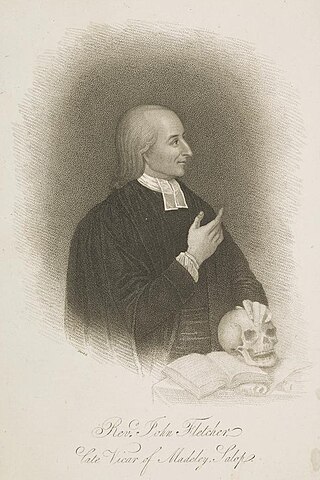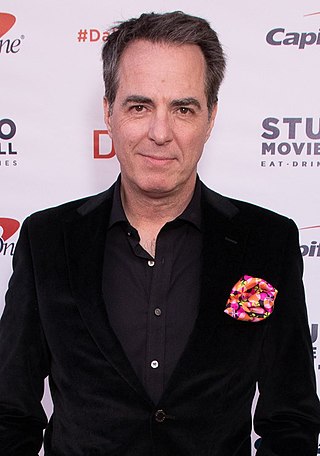
Arminianism is a movement of Protestantism initiated in the early 17th century, based on the theological ideas of the Dutch Reformed theologian Jacobus Arminius and his historic supporters known as Remonstrants. Dutch Arminianism was originally articulated in the Remonstrance (1610), a theological statement submitted to the States General of the Netherlands. This expressed an attempt to moderate the doctrines of Calvinism related to its interpretation of predestination.

The Free Methodist Church (FMC) is a Methodist Christian denomination within the holiness movement, based in the United States. It is evangelical in nature and is Wesleyan–Arminian in theology.
Methodism, also called the Methodist movement, is a Protestant Christian tradition whose origins, doctrine and practice derive from the life and teachings of John Wesley. George Whitefield and John's brother Charles Wesley were also significant early leaders in the movement. They were named Methodists for "the methodical way in which they carried out their Christian faith". Methodism originated as a revival movement within Anglicanism originating out of the Church of England in the 18th century and became a separate denomination after Wesley's death. The movement spread throughout the British Empire, the United States and beyond because of vigorous missionary work, and today has about 80 million adherents worldwide.

John Wesley was an English cleric, theologian, and evangelist who was a leader of a revival movement within the Church of England known as Methodism. The societies he founded became the dominant form of the independent Methodist movement that continues to this day.

Charles Wesley was an English Anglican cleric and a principal leader of the Methodist movement. Wesley was a prolific hymnwriter who wrote over 6,500 hymns during his lifetime. His works include "And Can It Be", "O for a Thousand Tongues to Sing", "Christ the Lord Is Risen Today", "Love Divine, All Loves Excelling", the carol "Hark! The Herald Angels Sing", and "Lo! He Comes With Clouds Descending".

Hugh Michael Jackman is an Australian actor. Beginning in theatre and television, Jackman landed his breakthrough role as Wolverine in the X-Men film series, a role that earned him the Guinness World Record for "longest career as a live-action Marvel character", until 2022. Prominent on both screen and stage, he has received various accolades, including a Primetime Emmy Award, a Grammy Award and two Tony Awards, along with nominations for an Academy Award and a British Academy Film Award. Jackman was appointed a Companion of the Order of Australia in 2019.

In Christian theology, synergism is the belief that salvation involves some form of cooperation between divine grace and human freedom. Synergism is upheld by the Catholic Church, Eastern Orthodox Churches, Oriental Orthodox Churches, Anabaptist Churches, Anglican Churches, and Methodist Churches. It is an integral part of Arminian theology common in the General Baptist and Methodist traditions.
Sanctification literally means "to set apart for special use or purpose", that is, to make holy or sacred. Therefore, sanctification refers to the state or process of being set apart, i.e. "made holy", as a vessel, full of the Holy Spirit of God. The concept of sanctification is widespread among religions, including Judaism and especially Christianity. The term can be used to refer to objects which are set apart for special purposes, but the most common use within Christian theology is in reference to the change brought about by God in a believer, begun at the point of salvation and continuing throughout the life of the believer. Many forms of Christianity believe that this process will only be completed in Heaven, but some believe that complete entire sanctification is possible in this life.

Thomas Clark Oden (1931–2016) was an American Methodist theologian and religious author. He is often regarded as the father of the paleo-orthodox theological movement and is considered to be one of the most influential theologians of the 20th century and the beginning of the 21st century. He was Henry Anson Buttz Professor of Theology and Ethics at Drew University in New Jersey from 1980 until his retirement in 2004.
Prevenient grace is a Christian theological concept that refers to the grace of God in a person's life which precedes and prepares to conversion. The concept was first developed by Augustine of Hippo (354–430), was affirmed by the Second Council of Orange (529) and has become part of Catholic theology. It is also present in Reformed theology, through the form of an effectual calling leading some individuals irresistibly to salvation. It is also in Arminian theology, according to which it is dispensed universally in order to enable people to respond to the offer of salvation, though it does not ensure personal acceptance.

"Christ the Lord Is Risen Today" is a Christian hymn associated with Easter. Most of the stanzas were written by Charles Wesley, and the hymn appeared under the title "Hymn for Easter Day" in Hymns and Sacred Poems by Charles and John Wesley in 1739. The hymn eventually became well known for the "Alleluia" sung as a melisma after each line, which was added by an unknown author, probably to fit the commonly used hymn tune, "Easter Hymn". It remains a traditional processional hymn on Easter Sunday.
The Methodist Church of Great Britain is a Protestant Christian denomination in Britain, and the mother church to Methodists worldwide. It participates in the World Methodist Council, and the World Council of Churches among other ecumenical associations.

John William Fletcher was a Swiss-born English divine and Methodist leader. Of French Huguenot stock, he was born in Nyon in Vaud, Switzerland. Fletcher emigrated to England in 1750 and there he became an Anglican vicar. He began to work with John Wesley, becoming a key interpreter of Wesleyan theology in the 18th century and one of Methodism's first great theologians. Fletcher was renowned in Britain for his piety and generosity; when asked if he had any needs, he responded, "...I want nothing but more grace."
Outward holiness, or external holiness, is a Wesleyan–Arminian doctrine emphasizing modest dress and sober speech. It is a testimony of a Christian believer's regeneration, done in obedience to God. The doctrine is prevalent among denominations emerging during the revival movements, including the Methodists, as well as Pentecostals. It is taken from 1 Peter 1:15: "He which hath called you is Holy, so be ye holy in all manner of conversation."

Wesley's Chapel is a Methodist church situated in the St Luke's area in the south of the London Borough of Islington. Opened in 1778, it was built under the direction of John Wesley, the founder of the Methodist movement. The site is a place of worship and visitor attraction, incorporating the Museum of Methodism in its crypt and John Wesley's House next to the chapel. The chapel has been called "The Mother Church of World Methodism".

Wesleyan theology, otherwise known as Wesleyan–Arminian theology, or Methodist theology, is a theological tradition in Protestant Christianity based upon the ministry of the 18th-century evangelical reformer brothers John Wesley and Charles Wesley. More broadly it refers to the theological system inferred from the various sermons, theological treatises, letters, journals, diaries, hymns, and other spiritual writings of the Wesleys and their contemporary coadjutors such as John William Fletcher, Methodism's systematic theologian.
The Wesleyan Methodist Church was the majority Methodist movement in England following its split from the Church of England after the death of John Wesley and the appearance of parallel Methodist movements.

Forgiveness, also known as Esther's Diary, is a 2008 American dramatic Holocaust film written and directed by Polish-American director Mariusz Kotowski, with a screenplay by Allan Knee. The film is marked as being the director's first feature-length film.
Pentecostalism is a renewal movement within Protestant Christianity that places special emphasis on a direct personal relationship with God and experience of God through the baptism with the Holy Spirit. For Christians, this event commemorates the descent of the Holy Spirit upon the followers of Jesus Christ, as described in the second chapter of the Book of Acts. Pentecostalism was established in Kerala, India at the start of the 20th century.

Johnathan Brownlee is a Canadian–American film producer, director and screenwriter. He co-produced the feature films Decoding Annie Parker (2013), Three Days in August (2016), Occupy, Texas (2016), Puppet Master: The Littlest Reich (2018), The Standoff at Sparrow Creek (2018), and Satanic Panic (2019).













